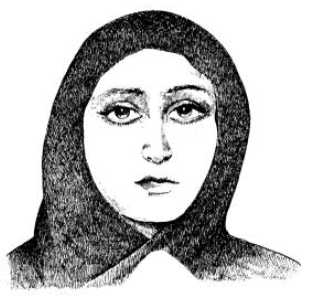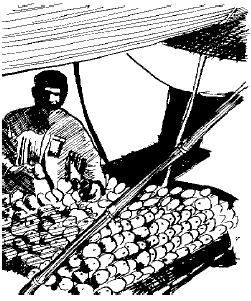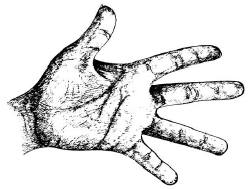Lesson Three
Dialogue three: Shopping
H: tsínga haal day? How are you? | څنګه حال دے؟ |
L: mirabaanee, khu yim. táaso tsínga yey? Thanks, I'm fine. How are you? | مِهربانى، ښۀ يم. تاسو څنګه يئ؟ |
L: de tu pukhto ke tsu wáayee? What do you call this in Pukhto? | دې ته پښتو کښې څۀ وائى؟ |
H: daa pyaaz dee. These are onions. | دا پياز دى. |
L: pyaaz kiló pu tso dee? How much is a kilo of onions? | پياز کلو په څو دى؟ |
H: awiya roopuy kilo. Seventy rupees a kilo. | اويا روپۍ کلو. |
L: yo paaw ráaka Give me one pao (quarter of a kilo). | يو پاؤ راکه. |
L: darzún kelé pu tso dee? How much are a dozen bananas? | درزن کېلې په څو دى؟ |
H: pu tsalwékht roopúy dee. They are forty rupees. | په څلوېښت روپۍ دى. |
L: Dere graane dee, luge arzaane raaka! They are very expensive. Give me a little cheaper! | ډېرې ګرانې دى، لږې ارزانې راکه! |
H: khayr day, pu peenzú dersh roopúy raaka. It's OK, give me thirty-five rupees. | خیر دے، په پينځۀ دېرش روپۍ راکه. |
L: Teek da. That's fine. | ټيک ده. |
H: noor tsu shay pukáar day? Do you want anything else? | نور څۀ شے پکار دے؟ |
L: na bas day, yaar. No that is enough, friend. | نه بس دے، يار. |
L: Tole tsoomra payse shwe? How much does it all come to? | ټولې څومره پیسې شوې؟ |
NOTE:
یار - yaar means 'friend'. It is not appropriate for women to use yaar when speaking to men. Ladies can use the phrase نه بس دے، مِهربانى. - na bas day, mirabaanee instead.
Ladies’ dialogue: Making friends
L: áasalaam aláykUm! Peace be upon you! | السلام عليکم! |
H: wa'alaykUm asaláam! And upon you be peace | وعليکم السلام! |
L: zu hálta oségum aaw zu pukhtó zdá kawúm. I live over there and I am learning Pukhto. | زۀ هلته اوسېږم او زۀ پښتو زده کوم. |
H: kha! dunúna ráasha! Good! Come in! | ښه! دننه راشه! |
L: pukhtó gráana da aaw zmaa lug madúd pukáar day. Pukhto is difficult and I need a little help. | پښتو ګرانه ده او زما لږ مدد پکار دے. |
H: kho zu pu leekúlo baande nú pohegum. But I don't know writing. | خو زۀ په ليکلو باندې نۀ پوهېږم. |
L: khayr day. hase zmaa swaal day che tu lug zmaa tulaafÚz Teek kawulay she? That's OK. My request is, can you simply correct my pronunciation? | خیر دے. هسې زما سوال دے چې ته لږ زما تلفُظ ټیک کولے شې؟ |
H: bílkUl! be ghuma sha! Sure! Don't be worried! | بالکل! بې غمه شه! |
L: daa tsu day? What is this? | دا څۀ دے؟ |
NOTE:

While Pukhtun women are very hospitable, they are also very busy. It is hard for language learners to find ladies to visit simply for brief conversations. It takes time to have tea, and be polite. So, relax and enjoy new friendships.
Numbers one to ten
| yo | 1 | ۱ یو |
| dwa | 2 | ۲ دوه |
| dre | 3 | ۳ درې |
| tsalór | 4 | ۴ څلور |
| peenzú | 5 | ۵ پینځهٔ |
| shpug | 6 | ۶ شپږ |
| oowú | 7 | ۷ اووهٔ |
| aatú | 8 | ۸ اتهٔ |
| núhu | 9 | ۹ نههٔ |
| lus | 10 | ۱۰ لس |
NOTE:
Urdu numbers are also commonly used, especially in the bigger cities.
A shopping list
👆 This list is a starting point only. On a sheet of paper, add other things you often need to buy. You will find that the words you use are the words you will remember. Role play shopping with your language helper.
Dried Food
| wréejze | rice | وریژې |
| ooRú | flour | اوړهٔ |
| cheenée | sugar | چینی |
| gárma masaala | curry powder | ګرمه مساله |
Vegetables
| gUl gopée | cauliflower | ګل ګوپی |
| Tepúr | turnip | ټېپر |
| moolúy | radish | مُولۍ |
| maTúr | peas | مټر |
Fruit
| angóor | grape | انګُور |
| aam | mango | آم |
| kelá | banana | کېله |
| sew, maNá | apple | سېو، مڼه |
| maalTá | orange | مالټه |
| amróod | guava | امرُود |
| naashpaatúy | pear | ناشپاتۍ |
Other Useful Items
| shaat | honay | شات |
| mahée | fish | مهی |
| ghaTa ghwákha | beef | غټه غوښه |
| narúy ghwakha | mutton | نرۍ غوښه |
| maastú | yogurt | ماسته |
| máalga | salt | مالګه |
NOTE:

How is your pronunciation going? Pukhtuns are so pleased you are learning their language that they will seldom correct you. You will have to find other ways to check yourself. One good test is to go to a shop and ask for an item without pointing to it. You know you are doing well when you get what you asked for. If you are having particular trouble with one sound, ask for something with that sound in it.
When you can get peas ټ - T, beef غ - gh and flour ړ - R without any trouble, you are doing well. The ultimate test is to go into a shop that does not stock the item you find hard to pronounce. Because the word is out of context you will only be understood if your pronunciation is accurate.
Pronunciation Drill
Contrasting r - ر and R - ړ
| daa soor day | This is red. | دا سُور دے. |
| daa soR day. | This is cold | دا سوړ دے. |
| hágha ghwaR day. | That is oily. | هغه غوړ دے. |
| hágha war day. | That is a door. | هغه ور دے. |
| zu láaRum. | I went. | زهٔ لاړم. |
| zu larúm. | I have. | زهٔ لرم. |
| daa zoR saRáy Róond day. | This old man is blind. | دا زوړ سړے ړُوند دے. |
Plural subject pronouns
| Person | Pronoun | Verb |
|---|---|---|
we | moong مُونږ | yoo یو |
you (plural) | táaso تاسو | yey یئ |
they | haghwée هغوی | dee دی |
Masculine plural nouns
Nouns in Pukhto agree by changing their endings. The two mose common masculine plural endings are ی - ee and ان - aan.
| singular | plural | |
|---|---|---|
saRáy a man سړے | --> | saRée men سړی |
DaakTúr a doctor ډاکټر | --> | DaakTuráan doctors ډاکټران |
Here are some examples:
| zu taalibílum yim. | I am a student. | زۀ طالبعلم يم. |
| taaso taalibilmáan yey? | Are you students? | تاسو طالبعلمان يئ؟ |
| haghá shpoonkáy day. | He is a shepherd. | هغه شپُونکے دے. |
| haghwee shpoonkée dee. | They are shepherds. | هغوی شپُونکی دی. |
NOTE:
Nouns can be either singular or plural (number), masculine or feminine (gender), and be one of two basic cases; direct or oblique. Depending on whether they are in the direct or oblique case, nouns undergo a number of inflections which will be introduced later.
Changing masculine nouns to their plural forms
👆 Have your helper say the sentence in the singular form. You make it plural.
Endings in ے - ay change to ی - ee
| hágha kamyáab saRáy day. | He is a successful man. | هغه کمیاب سړے دے. |
| haghwée kamyaab saRée dee. | They are successful men. | هغوى کامياب سړى دی. |
Consonant endings become ان - aan
| hagha mushahóor DaakTúr day. | He is a famous doctor. | هغه مشهُور ډاکټر دے. |
| haghwee mushahóor DaakTuráan dee. | They are famous doctors. | هغوى مشهُور ډاکټران دى. |
| tu yo kluk mUsalmáan ye? | Are you a strong Muslim? | تۀ يو کلک مُسلمان يې؟ |
| taaso kluk mUsalmaanáan yey? | Are you strong Muslims? | تاسو کلک مسلمانان يئ؟ |
| day yo maaldáar malík day. | He is a rich tribal leader. | دے يو مالدار ملک دے. |
| haghwee maaldáara malikaan dee. | They are rich tribal leaders. | هغوی مالداره ملکان دی. |
Endings in ا - aa and ی - ee change to ان - aan
| hágha mUláa ghaT day. | That mullah is fat. | هغه مُلا غټ دے. |
| hágha mUlayáan ghaT dee. | Those mullahs are fat. | هغه مُليان غټ دى. |
| hágha sust eesaaée day. | He is a lazy Christian. | هغه سست عيسائى دے. |
| haghwée sust eesaayáan dee. | They are lazy Christians. | هغوى سست عيسايان دى. |
Certain nouns change to انهٔ - aanu
| day kooN pukhtóon day. | He is a deaf Pukhtun. | دے کُوڼ پښتُون دے. |
| haghwée kaaNú pukhtaanú dee. | They are deaf Pukhtuns. | هغوى کانړۀ پښتانۀ دى. |
| day droond melmá day. | He is an important guest. | دا درُوند مېلمه دے. |
| haghwée draanú melmaanú dee. | They are important guests. | هغوى درانۀ مېلمانۀ دى. |
| zmáa tru Der khufa day. | My uncle is very upset. | زما ترۀ ډېر خفه دے. |
| zmáa tróona Der khufa dee. | My uncles are very upset. | زما ترُونه ډېر خفه دى. |
NOTE:
درُوند - droond literally means 'heavy', but also refers to an important or honourable person. In contrast, a worthless person is considered سپک - spuk.
Personal pronouns
| Person | Singular | Plural |
|---|---|---|
1st | zmáa my, mine زما | zmoong our, ours زمُونږ |
2nd | staa your, yours ستا | staaso your, yours ستاسو |
3rd masc. | du du his د دهٔ | du dey, du dwee their, theirs (near) د دئ، د دوی |
3rd fem. | du de hers د دې | du dey, du dwee their, theirs (near) د دئ، د دوی |
3rd masc. | du haghú his (far) د هغهٔ | du haghéy, du haghwée their, theirs (far) د هغئ، د هغوی |
3rd fem. | du haghé hers (far) د هغې | du haghéy, du haghwée their, theirs (far) د هغئ، د هغوی |
NOTE:
The pronouns, د هغئ - du haghey and د دئ - du dey may be heard colloquially, but the most standard forms are د هغوی - du haghwee and د دوی - du dwee. Refer also to the introduction of possessive pronouns in Lesson Seven.
Irregular family names
Here are four irregular plural forms of kinship terms:
| hagha khu plaar day. | He is a good father. | هغه ښۀ پلار دے. |
| haghwée khu plaaráan dee. | They are good fathers. | هغوى ښۀ پلاران دى. |
| staa wroor Der tukRá day. | Your brother is very strong. | ستا ورور ډېر تکړه دے. |
| staa wróoNa Der tukRá dee. | Your brothers are very strong. | ستا ورُوڼه ډېر تکړه دى. |
| zumaa mor stúRe da. | My mother is tired. | زما مور ستړې ده. |
| zmoong myande stúRe dee. | Our mothers are tired. | زمُونږ میندې ستړې دي. |
Comprehension drill: Counting
👆 This is the first drill where you will act like a soldier on parade. Simply obay the instructions without comment. The more vigorously you do so the more easily new words will stick. Teach your helper to slowly add new words according to your success, and keep going back and mixing them up.
| yuwa goota khkaara ka! | یوه کوته ښکاره که! |
| dwa goota khkaara ka! | دوه کوتې ښکاره که! |
| dre goota khkaara ka! | درې کوتې ښکاره که! |
| lus goota khkaara ka! | لس کوتې ښکاره که! |
NOTE:

Pukhto is a rhyming language. Here the ه - a ending on ګوته - góota (a finger) modifies tho یو - yo (one) to یوه - yuwa. More on this later.
Memorising moment
متلونه - matulóona
Reminder: First learn the proverbs and then explore their meanings with your new friends.
Exercises for lesson three
Substitute the words below for the underlined word in the sentence:
👆 Have your helper say the first sentence and then call out the words to be substituted in. This pattern of practice is best limited to known vocabulary words.
pyáaz pu tso dee? پیاز په ځو دی؟
- Make the following sentences plural:
- Use the correct form of the present tense of the verb “to be” to complete each sentence:
- Substitution: Use the words below to change the basic sentence:
| zu DaakTúr yim. | زهٔ ډاکټر یم. |